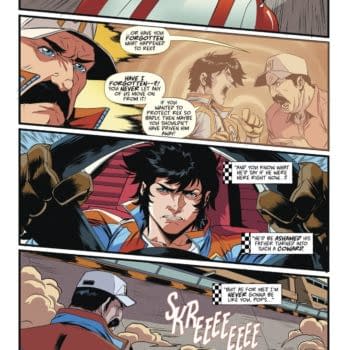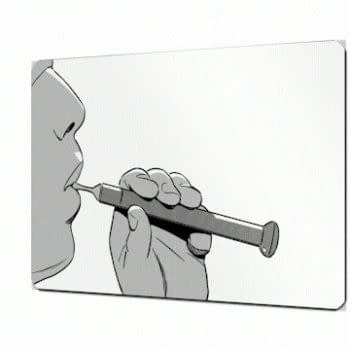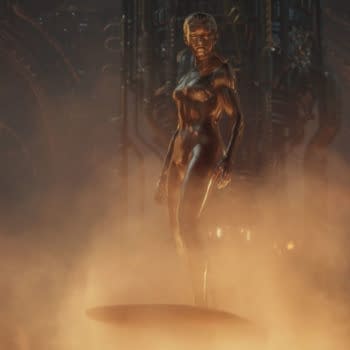Posted in: Comics, Recent Updates | Tagged: abe sapien, Art Balthazar, breaking bad, dark horse, Edward Grey, franco, greg rucka, hellboy, hellboy in hell, Itty Bitty Hellboy, john severin, Laurence Campbell, lobster johnson, mike mignola, New York Comic Con 2013, scott allie, Sledgehammer 44, tonci zonjic, veil
Why Hellboy Is Like Breaking Bad – The Bleeding Cool Interview With Scott Allie At NYCC
At New York Comic Con, I had the opportunity to talk to Scott Allie, Editor-in-Chief at Dark Horse Comics and co-writer of the ongoing series Abe Sapien, about the intricacies of the Hellboy universe and what's coming up for Big Red and his compatriots. He spoke about the breadth of the universe that has been created around Hellboy, how they keep things running smoothly in the midst of change, and even how Hellboy books have a similar schema to Breaking Bad. His insider tips will keep you on your toes if you think you know just where all these storylines are headed in 2014 and beyond.
Hannah Means-Shannon: What's coming up for Hellboy and Hellboy universe?
Scott Allie: March is the 20th anniversary for Hellboy and we're doing a lot of things to celebrate. One thing is a 20th Anniversary art book with things no one has ever seen before. It's a 20 dollar book with over 120 pages of stuff that Mike [Mignola] picked. B.P.R.D. comes out monthly, and for the first 5 months of next year, there's a variant cover promotion we're doing with covers by Mike Mignola, Richard Corben, James Harren. And each cover traces the history of the B.P.R.D. from Seeds of Destruction through to the current storyline.
HMS: How do you decide that's essential to keep the same within the Hellboy Universe and what's more flexible to change?
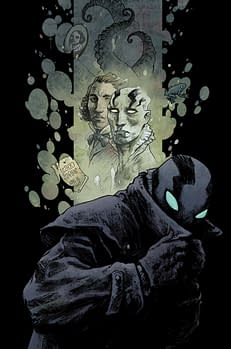
With our characters, they are going to change. They don't need to look the same. Hellboy lost an eye. Hellboy started off bright red, now less. And there are some crazy things going on. I mean, Hellboy's dead! He's in hell. And it's not like he's going to be in hell for a couple of issues and then he's going to join back up with the B.P.R.D. He's in hell and everything is different. And because he's in hell, everything has changed already too. So changing things, changing characters, and changing circumstances, is part of what keeps the story alive for us.
HMS: What about when you bring in new characters who are vaguely connected to the Hellboy Universe like Lobster Johnson or Sledgehammer 44? Do they kind of exist in their own pocket universes or will they be integrated more?
SA: Yeah, they are integrated. They integrate in a lot of different ways. And some of the integration is invisible for a long time because we know exactly how Sledgehammer ties into everything, and to what degree he ties in and to what degree he doesn't. And we have a lot of long plans. Like a lot of stuff with us is that we do "this" and it's going to be barely anything, but a lot later, it's going to be really important. So with Lobster Johnson, there's a limit to how much he ties in because, ironically, one of the weird things Mike Mignola did was that he started Lobster Johnson by telling the final stories of his life. And it's like, "Oh, well, he comes back as a ghost". Well he is, but to just have Lobster Johnson as a ghost running around fighting the Black Flame isn't what we wanted to do.
HMS: The recent books have jumped back in time…
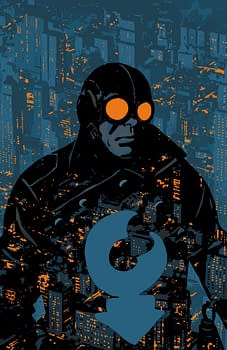
I read a great article about this idea of a "Clockwork Universe". The way that in a lot of genre fiction, you slowly realize that everything is neatly and inexplicably tied together. And the point of the article was that that doesn't really reflect real life. That sort of narrows the focus or it narrows the scope of your story because every single thing is wrapped up and every single thing ties into each other, and there's no real breathing room in that world. The article I read talked about how Breaking Bad defied the problem of the Clockwork Universe in a particular way.
And when I read it, part of what I thought was, "Oh, with Hellboy, part of the point is that it's not a finite universe. Part of the point is that these threads, they pop up, and then they just kind of move over here, and then that's it". And that makes it so that the reader can't really tell which ones are going to come back in. So, we might introduce a big idea, do some stuff with it, and then appear to forget about it. But did we? Maybe we did. Or maybe it's going to come back 35 issues from now in B.P.R.D. And it's also not like we have road-mapped this thing out perfectly. There's still a lot of room for new ideas to come up, to change ideas in large ways.
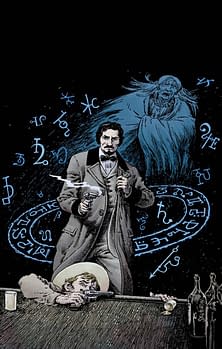
HMS: Kind of a chain-reaction there?
SA: Yeah. There's a great deal of interconnectedness, but it's not a closed system.
HMS: Who has the task of keeping the Hellboy universe straight?
SA: Mike [Mignola] has an amazing memory. Mike has the best memory of any of us. We keep notes. We talk frequently enough that it's never like, "Remember that thing that we talked about 5 years ago?" We talk frequently enough about this stuff that it keeps it kind of fresh. I've been keeping a lot of notes on Abe Sapien. It's an ongoing series and I know how long it's going to be, pretty long. And if Mike and I have some really cool conversation where he thinks of something about how it's going to end, I've got to write that down. Because it's going to be awhile before I write it. So, with Abe, I keep a lot of notes. With B.P.R.D., we keep different kinds of notes. Some of the communication is via e-mail and we save all that. Memory can really screw you over.
HMS: It's a huge task. It's just gets bigger and bigger all the time.
SA: I used to have an incredible memory, but when my son was born, it just got cut in half. I think it was because half my mind was suddenly occupied by something way more important than comics.
HMS: Any thoughts on why Hellboy has done so well in being translated into animation and film?
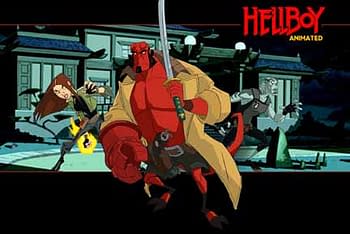
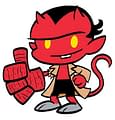
HMS: What about the noir elements and the historical elements that are present in the Hellboy Universe? They were always there from the beginning, but is that something that came about through wanting to work with certain artists, or is that something intrinsic?

HMS: So what books coming up at Dark Horse are you excited about?
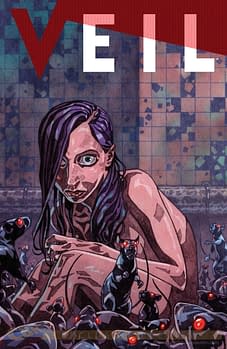
Greg kind of has a thing about creating amazing female characters. He's so flexible, he can create so many different kinds of worlds and characters. And Veil is going to surprise people. They aren't going to know what to expect. They are going to assume the wrong thing about what kind of book it is. And it's a book where I feel like you can't say much about it without the story suffering. If we tell you too much, it'll steal some of the thunder from it. So I feel like it's a book we have to promote without telling anybody too much about what it is. And just hope that Greg doing a female character with things you won't see coming is enough to get people on board. It's enough for me!
HMS: A big thank you to Scott Allie for taking the time to talk to Bleeding Cool during the madness of New York Comic Con. Of course, Dark Horse was the focus of plenty of frenzied fan madness at NYCC, proving it was a very good kind of madness, indeed.
Hannah Means-Shannon is Senior New York Correspondent at Bleeding Cool, writes and blogs about comics for TRIP CITY and Sequart.org, and is currently working on books about Neil Gaiman and Alan Moore for Sequart. She is @hannahmenzies on Twitter and hannahmenziesblog on WordPress. Find her bio here.










